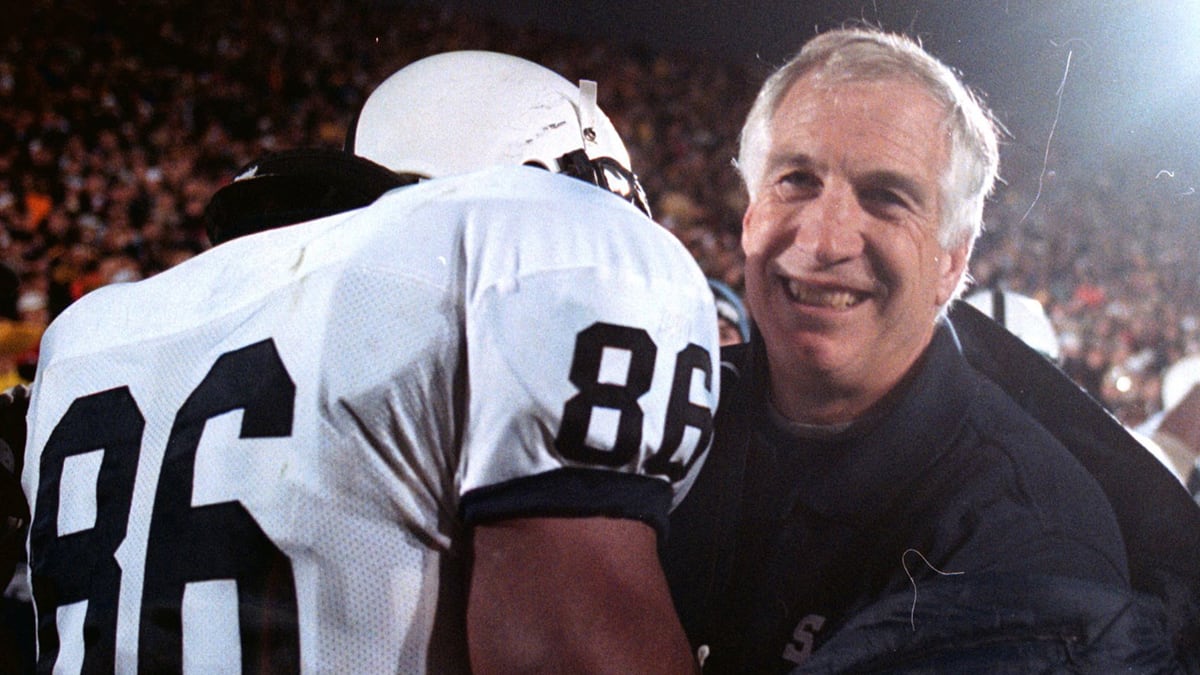What’s worse? Having your son be sexually abused by Jerry Sandusky or having your son play football for him?
Before you dismiss the question as offensive and absurd, read former University of Maryland and Carolina Panthers’ nose tackle Kris Jenkins in this Sunday’s New York Times. Here’s what Jenkins says about big-time football’s impact on his body. “I was past hurt. I was at the point of numb. My body was shutting down nervous systems so I didn’t have to deal with pain. The numbness started at the very beginning. I couldn’t feel part of both arms. I couldn’t feel part of both legs. It was worse on the left. I’m just starting to get feeling back in my left side.”
Here’s what Jenkins says about big-time football’s impact on his brain. “I got my first NFL concussion against Green Bay my rookie year…I had the punch-drunk feeling, seeing starbursts and feeling giddy…I remember one coach saying, the way he’s playing now, the concussion probably did him some good….I have had more than 10 [concussions], including college and the pros. Nobody cared…The brain fog? It still hasn’t stopped. It feels like you’re punch-drunk, like someone hit you over the head. It’s like you knock yourself stupid. When you have to concentrate on things, then it becomes an issue. My head gets foggy to the point where I can’t really function.”
Yes, of course, there are crucial differences between what happened to Jenkins and what happened to Sandusky’s alleged victims. Jenkins was an adult, not a child, and he decided voluntarily to let football destroy his body and mind. But let’s be clear about what “adult” and “voluntarily” mean in this context. Most college football players are too young to legally drink. And given their backgrounds, few have good professional options other than football and few have politically articulate friends and family who can draw attention to their plight. They say that if senators’ sons went off to war, American foreign policy would look very different. I suspect that if senators’ sons played Division I and professional football, the NCAA and NFL would look very different as well.
Once players join a team, they find themselves at the mercy of coaches who often care more about the players’ short-term capacity to help the team win than the long-term impact that playing injured might have on their health. As the Boston Globe’s Jackie MacMullan explained in a 2007 profile of former New England Patriots linebacker Ted Johnson, “Pressure to perform in a sport where there are no guaranteed contracts and where being ‘soft’ is the worst moniker that can be thrust upon you creates a culture in which players feel they must play through almost anything.” Johnson—like Jenkins—tells of being pressured by coaches to play through concussions. By the time MacMullan interviewed him, Johnson had endured so much brain trauma that he was spending whole days lying mute in a dark room. The NFL is now supposedly taking head injuries more seriously. That just leaves the rest of the body.
The thread connecting the sexual abuse that Sandusky allegedly inflicted in the Penn State showers and the abuse that coaches like him inflict on the playing field is this: In big-time football, morality is measured in wins and losses. Oh sure, coaches can get in trouble for violating league rules. But for the most part, nobody cares unless those violations keep the team from winning games.
The mentality that led Penn State students to riot after Joe Paterno was fired is no different from the mentality that leads New England Patriot fans like me to cheer Bill Belichick even though he was as indifferent to Ted Johnson’s physical and mental survival as Paterno was to the physical and mental survival of the boys Jerry Sandusky allegedly raped. To be a fan of a brutal sport like football is to put your moral faculties on hold. It is to hero-worship players while considering them disposable as human beings.
The coaches understand that; so do the players themselves. Writing about the football combine, where scouts examine prospects coming out of college, Jenkins remarks, “That’s when you realize, when you march in that room half-naked. I’m a number now.” So no wonder the Penn State students rioted. By forcing the university to reckon with Sandusky’s alleged crimes, they were injecting ethics into the pristine world of big-time football. If the press forced Belichick to resign for what he did to Ted Johnson, Patriot fans would likely riot too.
None of this makes Sandusky’s alleged behavior any less horrific. But I’m getting a little weary of hearing people say he besmirched the honor of the game. Read Kris Jenkins’s and Ted Johnson’s accounts of life in the NCAA and NFL and ask yourself: How much honor is there left to besmirch?






